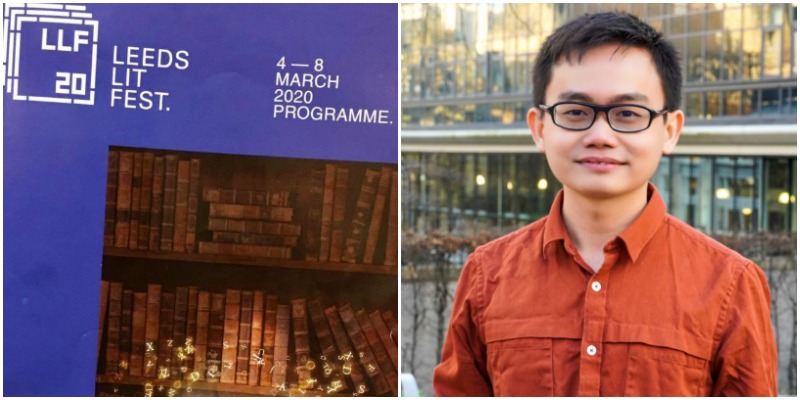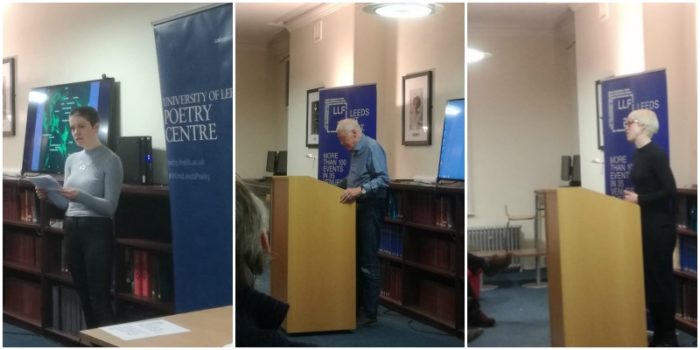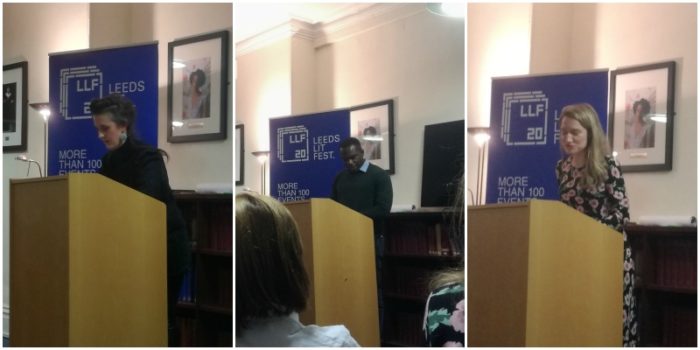Beyond Leeds Lit Fest

This year marked the second year for Leeds Lit Fest (LLF), taking place from the 4th-8th of March 2020, where there was over 100 marvellous events in 35 locations across the city of Leeds. Different kinds of activities were held, for example, poetry readings, workshops, walks, music performances, and so on. Therefore, I was very excited when I found out that Leeds Lit Festival (LLF) was recruiting for volunteers. I signed up to be a volunteer for Poets@Stage because of my interest in poetry recitation. This was a series of poetry readings presented by the University of Leeds Poetry Centre held at the Alumni Room of the School of English, University of Leeds. I really looked forward to the festival as I had missed a few chances of becoming a volunteer at the George Town Literary Festival, the capital city of Penang, Malaysia where I studied for my undergraduate degree. As a literature student at Leeds, I decided to grab the opportunity to be a volunteer at LLF 2020, and it turned out to be a wonderful experience.
When I reached the School of English, I was welcomed by one of the people in charge of the event. I was so happy when she gave me a goodie bag with my volunteer t-shirt. I was in charge of registration and payment with another volunteer. To my surprise, there were many golden citizens who attended the event. While waiting for the others who had registered, we talked about culture. As usual, it involved the weather, but the conversation did not stop there. Upon knowing that Malaysia is hot throughout the year, my volunteer friend asked me a question which I have not figured out a satisfactory answer. If my memory captured it correctly, it should be something like ‘How does weather affect people’s culture?’ Indeed, I believe that weather can affect one’s moods and thinking, thus subsequently affecting the formation of a culture. Although I am not going to delve into this topic in this blog post, I would still like to talk about the influence of culture.

Poets@Stage comprised readings from several poets, namely Jason Allen-Paisant, Kimberly Campanello, Hannah Copley, Helen Mort, Caitlin Stobie , and Jeffrey Wainwright. As a volunteer, I got the chance to join the audience in certain slots. The poets recited their own poems inspired by different aspects of life. During the readings, everyone was spellbound and watched attentively, as though what was presented was not merely a recitation, but a dance performed gracefully by the sensuous words flown from the hearts of the poets.

I glanced at the audience. So many of them were no longer in the prime of youth, yet they showed full enthusiasm in listening to the readings. Their passion was so intense that, for a moment, I believed their eyes were emanating a type of radiance. Was it the longing for knowledge? Was it the longing for a world that they had yet explored? Or was it the longing for the softest feelings that always slip through our lives imperceptibly?
It reminded me of what one of my literature lecturers told me a few years ago. She said you could discuss Jane Eyre with the elderly in public places of the UK. The audience at Poets@Stage was exactly an epitome of such a cultural system that emphasises the humanities. I would attend literary talks or seminars from time to time, and I often see golden citizens who listened attentively, some even made notes and asked questions during the Q&A sessions. These are really an eye-opener for me, at least when compared to the place I come from. In fact, it is also quite common to see people reading in public. I do not need to feel embarrassed to be seen reading outside the campus.
Perhaps the phenomenon reflected here is not just about the age group, but the overall attitude towards literature. Such an attitude is very much influenced by culture. I know there are many literature festivals in the UK, and my volunteer friend told me that there will be another one in Bradford. Literature is not an unpragmatic approach to fascination, or even worse, a way to escape from the reality that one is weak in maths and science. Regardless of age, interest, or capability, literature is about discovering the stories far away from our lives or stories so near to us that we often neglect them. When I say ‘story’, it does not refer to artificial fabrication because every life, including yours and mine, is a story.
When the event finished, I went to clear the registration table. Some members of the audience who passed by me said ‘thank you’ to me. How should I react? Did I do anything that helped them? I was just an ordinary volunteer who was doing my duty, but that ‘thank you’ made me realise that no contribution is ever too small to be worth being appreciated. Some may say that it is just a cultural habit, but why not practise this if it could uplift a soul? I have been at Leeds for about 6 months, but I will still feel that warmth every time people say ‘thank you’ to me.
That night on my way back home, I felt some sort of inexplicable lightness in my heart. I almost forgot that I was the only Chinese (is there a specific way to define ‘Chinese’?) in the room just now because I felt that I was a part of those who did not really know me, from the official in charge to my volunteer friend, to the members of the audience. Disheartening news of how the Chinese (or those who look like Chinese) were treated because of an appalling crisis was scattered across the social media. Frankly speaking, I have not encountered anything unpleasurable in the UK like those depicted. However, the factor is probably something beyond the culture in Leeds or any other city, it is something far more extensive, something which literature probably tries to awaken us to—the interconnected humanity that necessitates love and empathy.
